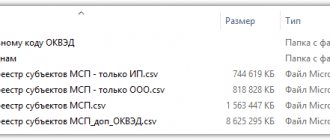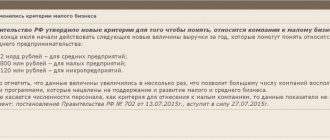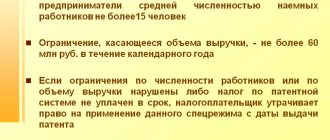Individual entrepreneur taxes
The amount of contributions paid by an individual entrepreneur without employees is prescribed in the Tax Code of the Russian Federation. The amount of contributions will increase in 2020:
- Mandatory pension insurance - 32,448 rubles;
- Compulsory medical insurance - 8,426 rubles.
In total, mandatory insurance premiums for 2020 are equal to 40,874 rubles. This is a fixed amount if the income for the year does not exceed 300,000 rubles. If the limit is exceeded, additional contributions to the Pension Fund of the Russian Federation are provided in the amount of 1%, but not more than 259,584 rubles (32,448 x 8).
What are the small business tax systems: advantages and disadvantages
Special modes have been developed to simplify accounting and budget payments. The choice of such options exempts payers from VAT and property tax. Receipts in favor of entrepreneurs are not subject to personal income tax. Organizations do not need to calculate income tax. These features are common and are recognized by experts as undoubted advantages. The systems also have specific characteristics.
Unified agricultural tax
The system is intended for agricultural producers. The regime is closely related to the type of economic activity. The tax is calculated on the basis of gross receipts reduced by business expenses. Costs must be documented with reference to Article 346.5 of the Tax Code of the Russian Federation. The general rate is 6%. Regions can reduce it.
Advantages:
Insurance fees for mandatory programs are included in the list of costs. Agricultural companies have the opportunity to reduce their cost base. The declaration must be submitted once. The report is submitted annually by March 31. The system is allowed to be combined with UTII and PSN. A loss gives you the right not to pay tax.
Flaws:
Businessmen whose trade line includes excisable goods cannot switch to the regime. Organizers of gambling are excluded from the list of taxpayers. Advance payments under the unified agricultural tax will have to be paid every 6 months. The maximum average number of employees should not exceed 300 people. Within the framework of the regime, there is a ban on combining with the simplified tax system. From 2020, in addition to the Unified Agricultural Tax, you will also have to pay VAT.
simplified tax system
The procedure for calculating tax depends on the object of taxation. If the payer takes into account only income, the simplified tax system is 6%. Fixation of commercial costs requires a single tax of 15%. Regions have the right to reduce rates.
Advantages:
Payers submit reports once a year. Entrepreneurs have been given until the end of April. Companies are required to submit a declaration by the end of March. Income and expenses are accounted for in one journal. A wide range of activities is considered a plus. Small business taxes are reduced by fixed insurance premiums and fees transferred to funds for employees.
Flaws:
If a taxpayer applies a 15% rate, he will have to pay money to the budget even in the event of a loss. A minimum contribution of 1% of turnover will be required to be transferred to the state.
The mode has limitations:
- asset value – up to 150,000 rubles;
- average number of personnel – up to 100 people;
- participation in the capital of other companies – up to 25%;
- annual turnover - up to 150,000,000 rubles.
The disadvantage is the inability to use deferments for online cash registers.
UTII
Taxation of small businesses under this regime has become voluntary since 2013. For each type of activity, regions approve a basic profitability. Tax is withheld from her at a rate of 15%. Payers apply adjustment factors. Actual revenue is not taken into account.
Advantages:
Entrepreneurs and companies are exempt from accounting for income and business costs. Taxpayers who do not have employees have the right to defer the purchase of an online cash register. When purchasing equipment, a deduction is provided. The mode is compatible with OSN, simplified tax system, unified agricultural tax. If there is no physical indicator (sale point, vehicle), you will not have to pay tax. Individual entrepreneurs can reduce UTII by fixed fees to the Pension Fund and the Social Insurance Fund of the Russian Federation. Obligations to the budget are reduced when paying insurance premiums under employment contracts.
Flaws:
Reporting will have to be submitted every quarter. It will not be possible to reduce the estimated base for commercial costs. The formulas for calculating UTII seem complicated to many businessmen. A loss or decrease in revenue does not affect tax liabilities.
It is allowed to switch to the mode subject to a number of restrictions:
- outlet area – up to 150 sq.m.;
- average number of personnel – up to 100 employees;
- refusal to participate in trust management or simple partnership agreements.
A prerequisite is the establishment of UTII by regional law.
PSN
The taxation system allows you to replace taxes on small businesses with one fee. The cost is determined by the potential income multiplied by the 6% rate. Regions have the right to introduce tax holidays for a period of 2 years. During this period, newly registered merchants and companies will be able to apply a 0% rate.
Advantages:
The advantage is the complete lack of reporting. You can carry out commercial activities immediately after acquiring a patent and before its expiration. Until 2020, PSN payers have the right not to install online cash registers. If they purchase them, they can use the tax deduction. The validity period of a patent varies from 1 to 12 months.
Flaws:
Fixed insurance fees and employee contributions are not deducted from the cost of the patent. The number of hired employees of PSN payers should not exceed 15 people. Participants in trust management or a simple partnership cannot switch to the system. Real income does not affect obligations to the budget. You can conduct business within the boundaries of a clearly defined territory. The disadvantage should be considered the limitation on annual turnover of 60,000,000 rubles and a closed list of areas of business activity.
The peculiarities of taxation of small businesses are partly related to the legal status. Registration as an entrepreneur does not deprive citizens of basic rights and obligations. If businessmen sell personal property, earn money from transactions with financial instruments, or receive income from other sources, the obligation to pay personal income tax arises. Remuneration outside the business is taxed as normal.
Important! Trade fees have been established in certain regions. Taxation rules are enshrined in Chapter 33 of the Tax Code of the Russian Federation. There is no talk about the voluntariness of their payment. Only patent holders and agricultural producers received exemptions from contributions. In 2020, trading fees were introduced in Moscow, Sevastopol and St. Petersburg.
Reporting of individual entrepreneurs without employees
The legislator was quite loyal to this category of taxpayers, reducing mandatory reports to a minimum. Individual entrepreneurs are allowed not to keep accounting records, subject to accounting for income, or income and expenses, or other objects of taxation and physical indicators (subclause 1, clause 2, article 6 of Law No. 402-FZ).
As for reporting on taxes and fees, an individual entrepreneur without employees at the end of the calendar year (tax period) submits:
- on the general system - a VAT return and a personal income tax return;
- on the simplified tax system - a declaration for the single tax of the simplified tax system;
- for UTII - a declaration for a single tax on imputed income for certain types of activities.
No more reports needed!
Benefits for payers working on a patent
The patent taxation system (hereinafter referred to as PSN) is applied by individual entrepreneurs along with other taxation regimes in relation to the types of activities provided for in paragraph 2 of Art. 346.43 Tax Code of the Russian Federation.
For example, in relation to:
- public catering services provided through public catering facilities that do not have a customer service area;
- services for slaughter, transportation, distillation, grazing;
- production of leather and leather products;
- production of dairy products;
- production of bakery and flour confectionery products;
- services (performance of work) for the development of computer programs and databases (software and information products of computer technology), their adaptation and modification;
- repair of computers and communications equipment.
The laws of the constituent entities of the Russian Federation may establish a tax rate of 0% for taxpayers - individual entrepreneurs registered for the first time after the entry into force of the preferential laws of the constituent entities of the Russian Federation (clause 3 of Article 346.50 of the Tax Code of the Russian Federation).
At the same time, the activities of the individual entrepreneur must be carried out in a certain area: production, scientific, social, and the share of profit received from the implementation of this activity must be at least 70% of the total total income. For example
, The Law of the Republic of Bashkortostan dated April 28, 2015 No. 221-z provides for tax holidays for individual entrepreneurs on a patent for the period from May 11, 2015 to December 31, 2020. Tax holidays are also provided for individual entrepreneurs registered in Moscow and carrying out certain types of activities in the period from March 25, 2015 to December 31, 2020 (Moscow Law of March 18, 2015 No. 10).
TAX BENEFITS FOR SMALL BUSINESSES USING THE EXAMPLE OF MOSCOW
Unified agricultural tax (unified agricultural tax)
As you know, the agricultural sector is one of the priority areas in the development of our country. They even developed a special tax regime for agricultural producers. Recently, those who provide these same producers with services related to crop and livestock production also received the right to use the Unified Agricultural Tax.
Among the disadvantages of the Unified Agricultural Tax is that income from the sale of agricultural products must exceed 70% of the total. This limitation forces many farmers to switch to a simplified system according to the “income minus expenses” scheme - for taxes the result is almost the same.
Benefits for small businesses
By Order of the Ministry of Finance of Russia dated November 8, 2010 No. 144n, amendments were made to the accounting legislation. All innovations concern small businesses and significantly simplify accounting, namely:
- Simplified accounting. Some Accounting Regulations (PBU), such as PBU 8/01, 18/02 and others (see below), do not apply.
- The number of accounting reports submitted to the tax authorities has been reduced. They only have:
- Balance sheet - Form No. 1 (quarterly);
- Profit and Loss Statement - Form No. 2 (quarterly);
- Average number of employees (annually).
- At the same time, all tax reporting remains in full.
By Order of the Ministry of Finance of Russia dated August 17, 2012 No. 113n, simplified forms of balance sheet and profit and loss statements for small businesses were introduced.
Enterprises with a small income are provided with the additional opportunity to take advantage of the value added tax benefit under Article 145 of the Tax Code of the Russian Federation, if the revenue excluding VAT for the 3 previous calendar months does not exceed 2 million rubles, and not be a VAT payer, but at the same time the enterprise is deprived of the right to issue invoices - invoices with VAT. This is done upon an application for benefits under Article 145 of the Tax Code of the Russian Federation.
Income and expenses using the cash method
Order of the Ministry of Finance of Russia dated November 8, 2010 No. 144n introduced changes to clause 12 of PBU 9/99 “Income of the organization.” Small businesses have the right to recognize revenue as funds are received from customers.
Organizations can use the cash method if several conditions are met:
- the organization has the right to receive this revenue arising from a specific contract or otherwise confirmed in an appropriate manner;
- the amount of revenue can be determined;
- the expenses that have been or will be incurred in connection with this operation can be determined.
These innovations give the right, but do not oblige, companies to determine revenue as funds are received and write off expenses for their payment. You can begin to apply the innovation from next year by specifying in your accounting policy the chosen method of recognizing revenue and expenses. But you should remember: if a company uses the accrual method in tax accounting, differences will inevitably arise in accounting according to PBU 18/02.
Non-application of PBU 16/02 and 2/2008
As a general rule, all commercial organizations (except credit institutions) must apply PBU 16/02 “Information on discontinued activities.”
Order of the Ministry of Finance of Russia dated November 8, 2010 No. 144n allows small business organizations not to apply PBUs 16/02 and 2/2008, which greatly simplifies the work of accountants of small business organizations.
The procedure for assessing financial investments has been simplified
As a general rule, the initial cost of financial investments for which they are accepted for accounting may change in cases established by law or PBU 19/02 (clause 18). In this case, for the purposes of subsequent assessment, financial investments are divided into two groups. The first is financial investments, which can be used to determine the current market price. The second is financial investments for which the current market value is not determined.
Innovations allow small businesses to carry out subsequent assessment of financial investments in the manner prescribed for the second group. Then financial investments are reflected in accounting and reporting as of the reporting date at their original cost (clause 21 of PBU 19/02).
Accounting policy
Clause 15.1. PBU 1/2008 will allow small businesses to reflect in their financial statements the consequences of changes in accounting policies prospectively, that is, from the beginning of making adjustments.
This procedure is provided for changes that have had or are likely to have a significant impact on the financial position of the company, the financial results of its activities and (or) cash flow. This rule does not apply to cases where the legislation of the Russian Federation and (or) regulatory legal acts on accounting establish a different procedure.
Error correction
PBU 22/2010 “Correction of errors in accounting” allows small businesses to correct significant errors of the previous reporting year without retrospective recalculation. This innovation will significantly simplify reporting.
For small businesses, clause 9 of PBU 22/2010 contains a rule that regulates the procedure for correcting significant errors of the past year that were identified after the approval of the financial statements for this year. A small enterprise has the right to correct such errors in the same manner as prescribed in paragraph 14 of PBU 22/2010 for minor errors.
This means that a small business entity, having discovered a significant error for the past year, after approval of the corresponding annual financial statements, can reflect the amount of the adjustment not on account 84 “Retained earnings (uncovered loss)”, like other organizations, but on account 91 “Other income and expenses". As a result of such accounting entries for small enterprises, the amount of adjustments when correcting errors of previous years will affect the financial result of the current reporting period.
Fines for small and medium-sized businesses have been replaced with warnings
Federal Law No. 316-FZ of 07/03/2016 amended the Code of Administrative Offenses (Article 4.1 was added and Article 4.1.1 was introduced), according to which from 07/03/2016 the fine will be replaced with a warning, subject to the simultaneous fulfillment of the following conditions:
- The individual entrepreneur or organization committed a violation for the first time;
- no property damage, harm to human life and health, harm to the environment, cultural heritage sites, or state security was caused;
- there was no threat of emergency.
For some violations, it is not possible to replace a fine with a warning. They will be fined for abuse of a dominant position in the product market, attempts to limit competition, disobedience to a legal order of employees of regulatory authorities, failure to comply with orders to eliminate violations, forgery of documents, stamps or seals.
This became possible due to the fact that:
- Article 3.4 has been supplemented with part 3 as follows:
- Article 4.1 of the Code of Administrative Offenses has been supplemented with part 3.5 as follows:
"3.5. Administrative punishment in the form of a warning is imposed in cases where it is provided for by the relevant article of Section II of this Code or the law of a constituent entity of the Russian Federation on administrative offenses for first-time administrative offenses in the absence of causing harm or threat of harm to the life and health of people, objects of flora and fauna , the environment, cultural heritage sites (historical and cultural monuments) of the peoples of the Russian Federation, state security, the threat of natural and man-made emergency situations, as well as in the absence of property damage”;
- The Code of Administrative Offenses is supplemented by Article 4.1.1 with the following content:
Article 4.1.1. Replacement of administrative punishment in the form of an administrative fine with a warning
- Those who are small and medium-sized businesses, persons engaged in business activities without forming a legal entity, and legal entities, as well as their employees, for the first time committed an administrative offense identified during the implementation of state control (supervision), municipal control, in cases where the imposition of an administrative penalty in the form of a warning is not provided for by the relevant article of Section II of this Code or the law of a constituent entity of the Russian Federation on administrative offenses, administrative punishment in the form of an administrative fine is subject to replacement with a warning in the presence of circumstances provided for in Part 2 of Article 3.4 of this Code, with the exception of cases provided for in Part 2 of this Code articles.
- Administrative punishment in the form of an administrative fine cannot be replaced by a warning in the event of an administrative offense provided for in Articles 14.31 - 14.33, 19.3, 19.5, 19.5.1, 19.6, 19.8 - 19.8.2, 19.23, parts 2 and 3 of Article 19.27, Articles 19.28 , 19.29, 19.30, 19.33 of this Code.
- If an administrative penalty in the form of an administrative fine is replaced by a warning, the additional administrative penalty provided for in the relevant article of Section II of this Code or the law of a constituent entity of the Russian Federation on administrative offenses is not applied.
"3. In cases where the imposition of an administrative penalty in the form of a warning is not provided for by the relevant article of Section II of this Code or the law of a constituent entity of the Russian Federation on administrative offenses, the administrative penalty in the form of an administrative fine may be replaced by a person who is a small and medium-sized enterprise and who carries out entrepreneurial activities without legal education. persons or legal entities, as well as their employees, to receive a warning in accordance with Article 4.1.1 of this Code.”
Features of labor regulation in microenterprises
Federal Law of July 3, 2020 No. 348-FZ “On introducing amendments to the Labor Code of the Russian Federation regarding the specifics of regulating the labor of persons working for employers - small businesses that are classified as micro-enterprises” was introduced into the Labor Code of the Russian Federation from 01.01.2017 Chapter 481:
Chapter 481. Peculiarities of labor regulation of persons working for employers - small businesses, which are classified as micro-enterprises
Article 3091. General provisions
For employers - small businesses (including employers - individual entrepreneurs), which in accordance with federal law are classified as micro-enterprises (hereinafter referred to as employers - small businesses that are classified as micro-enterprises), the regulation of labor relations and other directly related relations is carried out with taking into account the specifics established by this chapter.
If the employer has ceased to be a small business entity, which is classified as a micro-enterprise, and appropriate changes have been made to the information about it in the unified register of small and medium-sized businesses, no later than four months from the date of making the corresponding changes in the unified register of small and medium-sized businesses regulation of labor relations and other directly related relations with a given employer must be carried out in accordance with labor legislation and other regulatory legal acts containing labor law norms, without taking into account the specifics established by this chapter.
Article 3092. Regulation of labor relations and other directly related relations with the employer - a small business entity, which is classified as a micro-enterprise, by local regulations containing labor law norms, and employment contracts
An employer, a small business entity classified as a micro-enterprise, has the right to refuse, in whole or in part, from adopting local regulations containing labor law norms (internal labor regulations, regulations on remuneration, regulations on bonuses, shift schedules, etc.). At the same time, in order to regulate labor relations and other relations directly related to them, the employer - a small business entity, which is classified as a micro-enterprise, must include in employment contracts with employees conditions regulating issues that, in accordance with labor legislation, should be regulated by local regulations. These employment contracts are concluded on the basis of a standard form of employment contract, approved by the Government of the Russian Federation, taking into account the opinion of the Russian Tripartite Commission for the Regulation of Social and Labor Relations.
Commentary on Chapter 481 of the Labor Code of the Russian Federation
In connection with the amendments made by Federal Law No. 348-FZ of 07/03/2016, individual entrepreneurs and organizations related to micro-enterprises from 01/01/2017 receive the right to simplify their personnel document flow, i.e. The following local regulations containing labor law standards may not be adopted:
- internal labor regulations;
- wage regulations;
- bonus regulations;
- shift schedule.
The article was written and posted on November 17, 2012. Added - 02/16/2015, 03/15/2016, 04/08/2016, 07/05/2016, 08/29/2016
ATTENTION!
Copying the article without providing a direct link is prohibited. Changes to the article are possible only with the permission of the author.










